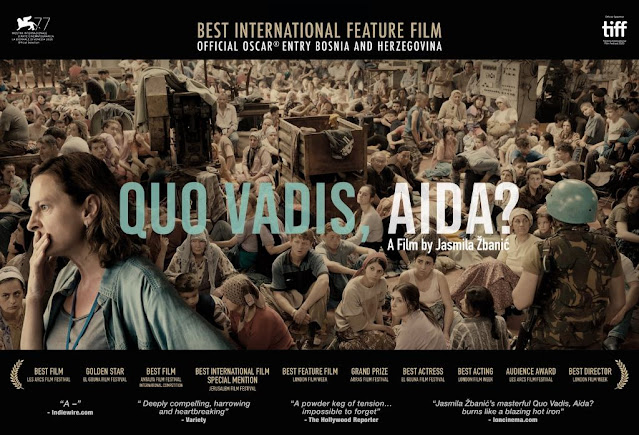Quo Vadis, Adia? (2021)
Directed By Jasmila Žbanić
Quo Vadis, Aida? (Where are you going, Adia?). As the title implies the whole movie questions its audience throughout. It's a story about a Bosina translator working for The UN, post-war struggling to save her family from the Serbian army. The opening of the film introduces us to Aida Selmanagić "The Bosina translator's" family Nihad Selmanagić (Adia's Husband), Hamdija & Sejo Selmanagić (Aida's sons) staring at Aida looking for answers. Yes! Aida had answers, she knew everything but yet she chooses to stay quiet. She believes and hopes that the UN would save and protect, so as the audience. There's a feeling of rage we share with Aida which holds us with concern and curiosity drives us deeper into the movie.
 |
| Adia looking for her Hamdija and Nihad |
As the story dwells more into its premise we understand that the UN stands helpless with no power in its hand. At this point, we develop a certain empathy for the clueless public waiting alone with hope for the war to end. In the scene where Aida shares a cigarette with their family, we start to resemble so close to the characters of the movie, being aware that Aida is a teacher, Nihad the school headmaster, Sejo a high school graduate whose birthday is in two days, and Hamdija a passionate musician. These grounded characters tell us that they are no different from you and me. But the director, Jasmila Žbanić decides to not stop there. It is in the most iconic scene of the movie where Aida shares a joint with two of the health workers who start kissing. she slips into a laugh and remembers the new year party night, where the whole town is celebrating, singing all along, dancing for an upbeat song, and even having a beauty competition. People dancing in a circle come to stand and stare at the static camera in slow-motion, looking due into the audience's eyes. There was a pinch in my spine as I looked at their faces. Žbanić undisputedly made us relate with the characters, she made us look at ourselves in it, every face was questioning, every face was looking for answers. As The UN completely loses its power and gets controlled by the Serbian Army. It gets horrifying within no time, armed soldiers enter the civilian UN camp against rules promising that everyone will be shifted to another nearby town safe. Though the promises seem suspicious, the responses by The UN bother much. Colonel Karremans, the leader of the UN camp and one of the most powerful characters ends here. We see the character falling to rock bottom as he locks himself in his room when people are getting killed outside. The helplessness of The UN creates sympathy but yet frustrating. I am surprised to see when one of the Serbian Army men calls Aida, his high school teacher. We witness the fact of community division at its extreme. Knowing that they were our very own neighbors, friends, students, and humans is more painful. We see Aida trying and begging the UN to save her family but the UN sticks to strict rules, ironically.
 |
| Adia staring at the bus driver |
Lets
the talk about the ending of the film. This ending is what makes Quo Vadis,
Aida? the most meaningful and powerful. It's in the coldest winter faces filled
with blood in their hands, living in progression. Adia visits her house looking
for memories of her murdered family. We realize how unrighteous it
is witnessing Serbian General Joka living in Aida's home with his happy family. There's a throbbing agony as we look at Aida. The echoed sobbing
of Aida leaves us in bitter anguish. She has nothing left to lose apart from
her dead son's decayed bones. Her life is been snatched and is being enjoyed by
the authorities. The ending is in a school function a new generation of
kids coming together and dancing where the whole town watches them dance. The choreography of the dance speaks to you by the shortest
route, hinting to open your eyes. The whole town including the victims,
the soldiers, the authorities, and the witnesses watches a new generation
opening their eyes and questioning them. Was it worth it? we see faces
retrospecting their past. The orchestral strings add a sense of empathy to this
scene. Finally, this movie leaves you with chills in your spine and agony.
The plot of the movie dominates the characters. Nevertheless, the characters have balanced with an awestruck performance. The acting seems veristic, Jasna Duricic who played Aida has conquered the movie by immersing the audience into the story. Although the story is lead by Aida, the story is more about its people. The long stares of the people's faces question our privilege towards democracy and freedom. After watching the movie I was guilty, angry, and sad of not being aware of the catastrophic "Bosnian war" as a 23-year-old Indian citizen. This film is not for Bosnian people, rather it's for the world from Bosnian people. Knowing that the biggest genocide happened not so long ago but three years early from my year of birth terrorizes me. Quo Vadis, Aida? is more than a film.

Comments
Post a Comment